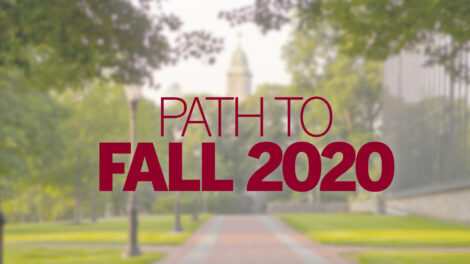Notice of Online Archive
This page is no longer being updated and remains online for informational and historical purposes only. The information is accurate as of the last page update.
For questions about page contents, contact the Communications Division.
Director of health services and college physician, Jeffrey Goldstein, M.D., talks coronavirus and keeping Lafayette community safe in uncertain times
By Stella Katsipoutis-Varkanis
Director of health services and college physician Jeffrey Goldstein, M.D., is a crucial member of the Lafayette staff as the champion for the health and safety of students and employees alike—a role that’s recently been magnified by the coronavirus pandemic. Today, his reliable campus-wide email updates about COVID-19 have made him a household name, and a source of comfort, for the Lafayette community during a time of uncertainty. Here, he tells us what it’s like to be Lafayette’s very own “Dr. Fauci”—or medical point person—during the coronavirus crisis.
How has the coronavirus changed your role at Lafayette?
Planning has become my full-time job. I am just as, if not more, busy as before, just in a different way. Since the vast majority of students went home, I have pivoted to creating plans and providing advice to the president and senior staff for mitigating the impact of COVID-19, and creating a framework for reopening in the fall.
My experiences managing different outbreaks over the years—like the norovirus outbreak that closed campus for a couple of days a few years ago—has gotten me to the point where I can better understand the drivers of transmission and the best practices for mitigating those drivers. It’s challenging to keep up with the pace of the changing landscape, and it’s an entirely different dynamic on campus than it is out in the community. It’s an added layer of concern getting the students to understand they have a very important social responsibility as sort of a vehicle for transmission to the more vulnerable segments of our community, such as faculty, staff, and other employees who are in high-risk groups.
Fortunately, we have an amazing leadership team in place, of which I am a small part. We want to make sure we fulfill our mission of giving students a great curricular and co-curricular experience that develops their minds—while at the same time ensuring their health and safety, and that of those who work for them.
What are your biggest lessons learned from COVID-19?
The mental part of managing this is just as important as the physical part. Social distancing is important, but it’s equally important not to socially isolate. It’s easy to fall into the trap of social isolation, and that creates a whole new set of problems like anxiety and depression, which have a tremendous impact on one’s health and well-being. You also have to stay active. If you don’t stay active, have another outlet for your stress and keep your mind occupied with other things, like reading a good novel.
It’s also the first time in my career that trying to predict what’s going to happen [with a health crisis] was incredibly challenging, if not impossible. I’m an epidemiology nerd. I love to read about how outbreaks occur and try to predict how they might impact our own community, and I talk to many people in areas of epidemiology and infectious diseases. COVID-19 has really baffled me. Every few days, it punches you in the mouth in a different way. So, it’s a lesson learned that you have to be prepared for the worst. It’s actually been quite a humbling experience for me as a public health person.
How does it feel to be the person everyone looks to for reliable updates on the pandemic?
It’s a weighty responsibility. I’m not happy that the country is in the position that we’re in, but I look upon this as a challenge. I’m a history buff, and my favorite person to read about is Abraham Lincoln, who led this country through a far greater period of diversity in our history. One of my favorite quotes of his is,”‘Determine that the thing can and shall be done, and then we shall find the way.” We’re going to find a way back [to normal], and I’m going to help Lafayette do it.

1 Comment
My son is going to be a freshman and after reading this I feel assured he will be in very good hands. Thank you!
Comments are closed.